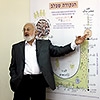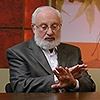Audio Version Of The Blog – 1/22/23
Listen to an Audio Version of the Blog
Download:MP3 Audio

Listen to an Audio Version of the Blog
Download:MP3 Audio

Michael Laitman, On The Times of Israel: “Living in a World of Gray People”
A student told me about a forty-four-year-old woman who had decided when she was younger never to have children. But now that she is older, she wonders if she made the right choice because even though she has friends and relatives, it is not the same as having her own children, so she is afraid of growing old alone.
She is not the only one, the student told me. Today, many young people do not want to have children, either because they do not want to raise them in such a terrible world, or because they feel that there are too many people in the world already, and the planet cannot support all of us.
I cannot say that these stories surprise me. When people suffer, when they see that life is tough and they are only trying to survive, it is only natural for them not to want their children to experience it. As a result, many decide not to have children.
At the same time, the phenomenon of childlessness is much rarer in third-world countries than it is in Western countries, where the standard of living is much higher. This makes no sense unless we take into consideration that the quality of life is measured not only by one’s ability to provide for one’s physical existence, but also, if not mainly by one’s sense of happiness in one’s social environment.
When people have secured their physical existence but cannot find emotional satisfaction, their lives become gray, colorless. Especially in Europe, where people have everything, they also have coldness in their hearts and grayness in their lives. Nothing is more depressing than a colorless world, especially for children, so people do not want to bring them into such a world.
When my student asked what I thought would happen to those children who are born into today’s gray world, all I could tell him was what the wisdom of Kabbalah says, as I had seen it written in the writings of Baal HaSulam and as my teacher, RABASH, the firstborn son and successor of Baal HaSulam, had told me. They say that unless we change the society we live in, humanity will plunge into another era of world wars. They predict a third, and even a fourth world war, but this time nuclear ones.
Since the end of World War II, we have had a relatively quiet period, without global conflicts. It was a time when we could harness the lessons from the two world wars we had experienced in the first half of the 20th century, but we didn’t. We kept on arguing and fighting “cold” wars and proxy wars, until the window of opportunity had closed on us, and now we are approaching the realization of the warnings of Baal HaSulam and his son, RABASH.
For all the knowledge humanity has gained, for all its power, technological, military, and industrial achievements, and for all our knowledge of history, we cannot seem to change the course of the world toward anything enlightened, toward a good future. The one thing humanity has not learned throughout time is how to make our lives safer and calmer by simply caring for each other.
Instead of using our knowledge to improve our lives, we are playing with it like toddlers holding a loaded gun. This cannot end well.
If we want to add brighter colors to our world, we have to add another field of knowledge to our learning: how to care without wanting to dominate. These brighter colors lie with the people around us: They are the new perspectives that they bring, the new ideas and attitudes that enrich human society. If we embrace these myriad colors that surround us, the differences between us will not threaten us but strengthen us.
If we want to add some blue-sky colors to our lives, we need to find new horizons, horizons that exist in the dreams of others. If we learn to care about them, they will become our dreams, as well. If we want to add some green-grass colors to our lives, we must learn to be happy when our neighbor’s lawn is greener than it was. Not that it is greener than ours, but simply that it is greener than it was, and that our neighbor feels happy and content.
If we do this, then we will add the color I like the most: orange, the color of the sun. We already know all that we need to know in order to live in a sunny world. Now all we need is to learn how to care.
[308115]
 Question: There is a story that Darwin was explaining his theory of evolution to a nobleman for a long time. The man was listening, agreeing with the scientist’s impeccable logic. In the end, Darwin concluded: “Now do you agree that man descended from a monkey?” The nobleman replied, “Maybe you have, but I have not.”
Question: There is a story that Darwin was explaining his theory of evolution to a nobleman for a long time. The man was listening, agreeing with the scientist’s impeccable logic. In the end, Darwin concluded: “Now do you agree that man descended from a monkey?” The nobleman replied, “Maybe you have, but I have not.”
A lot of people write to you: “Indeed, the world is egoistic. Selfish people, neighbors, friends, and even relatives. But I don’t feel that way. I both give and love.”
Why can’t a person break through to himself and say, “This is how I am,” and really feel it?
Answer: He doesn’t feel it. We don’t see outside ourselves! Maybe a little, perhaps, but not everywhere or always. Sometimes I have some remorse for the past; however, it is partial. Here and there I’ll come up with maybe a dozen times in my whole life.
Question: But I won’t flagellate myself?
Answer: No way! That very ego protects us from this and does not let us see the truth.
Question: At the same time, you say the truth is when one realizes his evil, not someone else’s evil, but one’s own evil. If so, how can we approach it?
Answer: We will work on ourselves. We will attract the upper light with special actions—rapprochement between us—and then we will feel that we are truly egoistic.
You really need to break into yourself. The war is about getting into your own heart, not into the heart of another.
Question: You talk all the time about connection, getting closer to others, and so on. How does this make its way into your heart? Let’s say I am trying to connect with someone I hate or, perhaps, dislike.
Answer: Don’t start with someone you hate.
Question: Even for the sake of good connection, for general rapprochement. How does it pierce my heart?
Answer: It opens your heart and brings it closer to other hearts. These are the first steps that need to be taken.
Question: Do these steps get more complicated?
Answer: Naturally.
Question: So, what is the biggest challenge? Can you tell us what the end goal is? What is the final stage? What do we reach?
Answer: I don’t know that yet.
This is a total correction of all beings you can incorporate in your heart. It will include them and give them all a place and fill them with your love.
Question: So, do I include the whole world in myself?
Answer: Into myself. And I fill it all with love.
Question: You keep saying that the name of the Creator is love. Does it mean that I am filled with the Creator?
Answer: Yes, you are filled with the Creator. You include in yourself all desires, all qualities, of everything that exists, and fill them all with the Creator, that is, with love.
[307196]
From KabTV’s “News with Dr. Michael Laitman” 9/22/22
Related Material:
“Take Off The Rose-Colored Glasses!”
When We No Longer Want to Hurt Others
Between The Monkey And The Creator
Answer: Goodness is an understanding of interdependence—all the way to love. And evil is vice versa.
Question: But each side in any conflict thinks that it is doing good.
Answer: We need to rise above ourselves and start thinking only about making everyone feel good, not one at the expense of the other. Otherwise, we will not get anywhere. We must learn what mutual connection, mutual dependence, mutual restriction, mutual support, and so on, mean.
That is, we must create systems that will include absolutely all of humanity. These are systems of integral development.
We must understand that we will not be able to survive otherwise. Nature will drive us out of this planet, out of this world, if we cannot establish a system that will take care of everyone.
[307799]
From KabTV’s “Blitz Questions and Answers” 1/6/23
Related Material:
I Want Everyone To Feel Good!
Connection Above All The Differences
Summing Up The Roundtable Discussion
 All the worlds in the thought of creation, called “the light of Ein Sof,” and what contains the receivers there is called Malchut of Ein Sof” (Baal HaSulam, The Study of the Ten Sefirot, Part 1, “Inner Observation,” Chapter 6).
All the worlds in the thought of creation, called “the light of Ein Sof,” and what contains the receivers there is called Malchut of Ein Sof” (Baal HaSulam, The Study of the Ten Sefirot, Part 1, “Inner Observation,” Chapter 6).
The light of Ein Sof (Infinity) is the light that comes to us from the Creator and fills the desire without any changes in the desire. Therefore, the light itself is infinite; there are no changes in it.
When the desire created by the light becomes opposite to the light, then it is called Malchut of the world of Ein Sof (Infinity). An absolute desire to receive, to be filled, appears in it while in the light there is only a desire to bestow and fill. Therefore, light and desire are opposite to each other.
The Light of Ein Sof emanates from Atzmuto until the upcoming end of correction, which is the end of the action. In principle, it contains all the information about everything that should take place before the end of the correction of creation.
[307748]
From KabTV’s “The Study of the Ten Sefirot (TES)” 1/1/23
Related Material:
The Infinity Of The Creator And His Creation
An Infinite Source Of Pleasure
How Can We Attain Infinite Pleasure?
 Question: What does it mean to sacrifice my egoism? Let’s say I want to enjoy something in this world. Then what? Am I making a restriction on this desire?
Question: What does it mean to sacrifice my egoism? Let’s say I want to enjoy something in this world. Then what? Am I making a restriction on this desire?
Answer: If this action is directed at harming others or nature, then we should try to limit ourselves and not apply it. This is called offering sacrifice.
Question: But if I just enjoy without harming anyone with my pleasure, is that okay?
Answer: Yes, of course. This is why the wisdom of Kabbalah explains what sacrifice means and how it should be done.
Suppose a person has a desire to enjoy at the expense of another, and the fact that he does not allow himself to do this, he sacrifices his desire to enjoy by using someone for his own sake, meaning, he sacrifices his egoism.
[307751]
From KabTV’s “Spiritual States” 1/8/23
Related Material:
Bringing A Sacrifice Is Getting Closer To The Creator
Sacrifices That Bring Us Closer To The Creator
An Oath That Cannot Be Broken
 Question: From where are the origins of handwritten and printed texts?
Question: From where are the origins of handwritten and printed texts?
Answer: Handwritten text does not come from Kabbalah. Kabbalah has never welcomed recordings. Why record? Either you enter into the feeling of the global universe sensorially or not.
There is a teacher and a student. The teacher explains to the student what to do, and to the extent that he can adapt this technique, he begins to expand his sensors of feelings.
Therefore, relatively few books have been written in the entire history of the development of Kabbalah. They appeared only 2,500 years ago. Before that, people knew everything by memory; they had a sense of the upper world, so there was nothing to write about if they perceived it anyway.
Similarly, the method of revealing the upper world was not described since children simply adapted it in themselves. From childhood, they were taught to perceive the spiritual world through the correct attitude to others, and at the age of three to six years, they entered into its attainment. It was absolutely natural for them! The environment influenced them that way.
[307406]
From KabTV’s “I Got a Call. The Difference between Handwritten and Printed Text” 1/21/12
Related Material:
Don’t Put On Paper What Is Meant For The Heart
The Group Makes You A Hero
Defining The Terms Is Key To The Study Of Kabbalah
 Question: Man is an uncorrected mechanism. What needs to be added to him so that it changes in your perception?
Question: Man is an uncorrected mechanism. What needs to be added to him so that it changes in your perception?
Answer: I am working on him, a little more, and a little more, and more
And while he is screaming, jumping, doing something for or against, wanting or not wanting something, he suddenly falls, sleeps, or something else. There is no other way. I am patiently waiting.
Comment: But you also work directly on a student. It is not just his job.
My Response: Of course. Naturally.
Question: How can a student allow you to work harder?
Answer: By trying to flow along with me and not resisting internally as much as possible. It is very difficult!
Question: Were you like that regarding Rabash?
Answer: Much worse. It is very difficult!
In one of my books, I described the story of David Lakes about unwavering trust in his Kabbalah teacher. One evening, they were sitting at a meal, and no one had a penny in their pocket—they were all very poor. Suddenly, the teacher said to him: “David, give me money to buy mead.” The student put his hand in his pocket and pulled out a gold coin.
This is not a trick but a true story of the clothing of the light of Hochma in the light of Hassadim. We do not understand this, so the story seems like a fairy tale or an interesting parable to us. But in fact, it is true.
[307693]
From KabTV’s “I Got a Call. Laitman – Before and After attainment” 1/28/12
Related Material:
A Real Teacher Is Felt With The Heart
How To Start Hearing The Teacher
Like Student, Like Teacher
Preparation to the Lesson
| [media 1] | [media 2] |
Zohar for All “Introduction to The Book of Zohar,” “On the Night of the Bride,” Item 125
| [media 3] | [media 4] |
Writings of Baal HaSulam “Introduction to The Book of Zohar,” Item 63
| [media 5] | [media 6] |
Selected Highlights
| [media 7] | [media 8] |
 Michael Laitman, On Quora: “What’s the difference between an emotion and a desire?“
Michael Laitman, On Quora: “What’s the difference between an emotion and a desire?“
When we realize our desires, then we feel emotions. In other words, the feeling of a desire’s fullness or emptiness is called “emotion,” but it is the same desire. That is, emotion is a phenomenon within the desire.
We are activated by our desires at every moment, and we constantly try to realize the desires surfacing in us.
Desires awaken and grab hold of us, directing us to try and fulfill them, and the way in which we work with our desires depends on our social and environmental influences, i.e. the kind of upbringing and education we receive, and the values of the society we live in.
Were it not for our intellect and our social influences that can guide our intellect to navigate our desires, then our desires would overwhelm us.
It is thus in the balance between the intellect and the emotion, i.e. the extent of the intellectual force that we develop over our desires, that determines the extent to which we can control ourselves and our emotions.

Based on the video “What Is the Difference between Emotion and Desire?” with Kabbalist Dr. Michael Laitman. Written/edited by students of Kabbalist Dr. Michael Laitman.